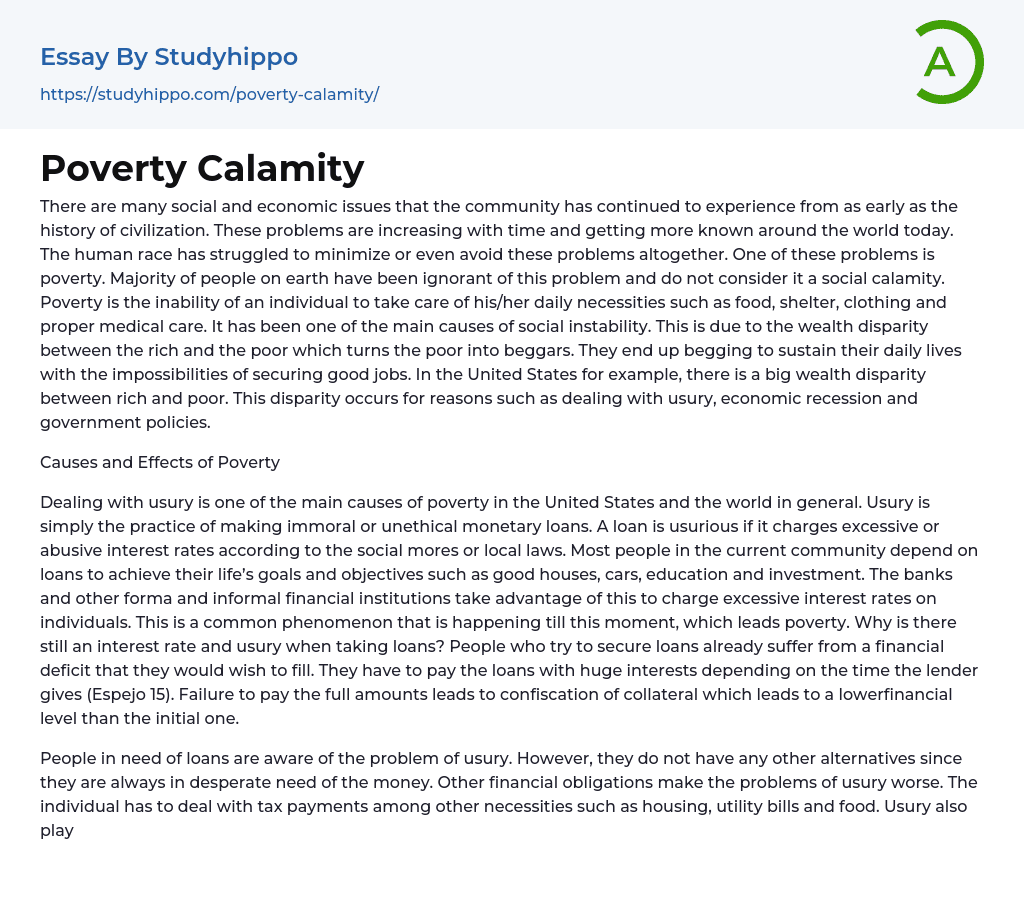Throughout history, humanity has faced numerous social and economic issues that continue to afflict communities around the world. These problems have worsened over time, becoming more prominent in today's global society.
One of these issues is poverty, which often goes unnoticed as a significant social crisis. Poverty refers to individuals' inability to fulfill basic needs such as food, shelter, clothing, and healthcare.
Consequently, this disparity in wealth between the rich and the poor leads to social instability and compels those with fewer resources into a life of dependence and destitution. The impoverished are left with no alternative but to resort to begging in order to meet their daily needs since finding stable employment is increasingly unachievable.
In the United States, this wealth gap is especially evident and can be attributed to various factors including usury practices, economic downturns, and governmental policies.
...Usury, the practice of charging excessive interest rates on loans, is the main cause of poverty both domestically and internationally. Many people depend on loans to achieve important life goals like owning homes, cars, getting an education, and investing. However, banks and other financial institutions exploit this reliance by imposing exorbitant interest rates. This perpetuates poverty as individuals in desperate situations have no alternative means to secure loans and face a financial deficit. Repaying these loans becomes a struggle due to high interest rates imposed by lenders, often resulting in collateral confiscation that further worsens their situation.
Moreover, usury exacerbates the problems associated with other financial obligations such as tax payments, housing expenses, utility bills, and food costs. Additionally, it widens the wealth gap between the rich and poor as wealthy individuals already have stakes in lending institutions where
they charge high interest rates that increase their wealth while impoverishing the poor population.
Furthermore, economic recessions significantly contribute to global poverty levels. For instance, the 2008 financial crisis triggered a global recession with lasting effects on poverty worldwide. Initially impacting large corporations only, it eventually affected local businesses and individuals as well. As all businesses rely on international markets to some extent,the recession had negative economic and social consequences for everyone involved.The consequences of these events included a rise in unemployment and a shift in social classes, as many middle-class individuals experienced substantial financial losses and moved down to the lower class. Even the upper class was not spared from these losses and also moved downwards. The increase in poverty primarily affects the lower class due to heightened competition for jobs, leading to higher rates of unemployment and lower per capita income. This presents challenges for individuals and their families in supporting themselves. It is essential to acknowledge that this issue of poverty is not restricted to one specific location; it is a global problem. The population affected by poverty continues to search for employment with hopes of escaping their impoverished circumstances in the future.
One of the main causes behind poverty lies within poor government policy formulation. It is the responsibility of governments to effectively manage national budgets in order to reduce levels of poverty and decrease living costs. However, over recent decades, there has been a significant failure on part of governments prioritizing the needs of those who live below the poverty line. Consequently, homelessness and begging have increased as housing and food expenses continue rising. As a result, citizens find themselves trapped within
their own country's bordersThe widespread unemployment in the population has made it extremely difficult for many people to support themselves. The government's allocation of taxpayers' money towards projects like war and space exploration has caused ordinary citizens to suffer. It is crucial for the government, as the authority responsible for enforcing laws and implementing policies, to address poverty issues before they become a national crisis. Both poor and wealthy individuals have equal rights as citizens to a comfortable life, so it is the government's responsibility to provide affordable housing and education. Education plays a key role in enabling people to seize opportunities both domestically and internationally. Adequate housing also promotes a sense of belongingness and peaceful coexistence (Wagner 54). In conclusion, poverty is a critical crisis globally, including in the United States. It encompasses hunger, homelessness, and wealth disparity between rich and poor individuals. Additionally, usury worsens this division by enriching the wealthy while impoverishing the poor. The mismanagement of government further exacerbates homelessness, unemployment, and overall poverty levels.In order to address these challenges, it is crucial for the government to consult economic experts and implement policies that prioritize the well-being of its population. Additionally, society as a whole must work together to eradicate poverty and promote social welfare.
- Overpopulation essays
- Homelessness essays
- Hunger essays
- Dumpster Diving essays
- Homelessness In America essays
- Bank essays
- Banking essays
- Corporate Finance essays
- Credit Card essays
- Currency essays
- Debt essays
- Donation essays
- Enron Scandal essays
- Equity essays
- Financial Accounting essays
- Financial Crisis essays
- Financial News essays
- Financial Ratios essays
- Financial Services essays
- Forecasting essays
- Foreign Exchange Market essays
- Free Market essays
- Gold essays
- Investment essays
- Legacy essays
- Loan essays
- Market Segmentation essays
- Money essays
- Personal finance essays
- Purchasing essays
- Retirement essays
- Shareholder essays
- Stock Market essays
- Supply And Demand essays
- Venture Capital essays
- Abortion essays
- Abuse essays
- Animal Rights essays
- Animal Testing essays
- Assault essays
- Bullying essays
- Controversial Issue essays
- Crash essays
- Cyber Bullying essays
- Feminism essays
- Human Rights essays
- Immigration essays
- Inequality essays
- Poverty essays
- Prejudice essays




